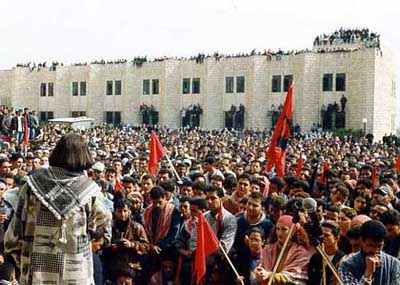
As in previous years, the Birzeit student council elections were widely reported as a victory for the Islamic movement over the mainstream PLO Fatah faction, in line with the Israeli-encouraged perception of the university as a radical rather than a mainstream institution.
In fact, Birzeit's Islamic Bloc simply retained its 20 seats from the previous year, a minority Islamic faction on campus actually lost its sole seat, and it was the independent and left-wing blocs that made all the gains. An analysis by the Birzeit Web team confirms this view.
Fatah saw two of its previously-held 22 seats go to the Democratic Student Pole, a left-wing coalition that rose from eight to ten seats, and lost another seat to the one-year old Change Bloc, an independent 'anti-faction faction', which itself took over the single seat previously held by the Bloc of the Martyr Fathi Shiqaqi, a minority Islamic faction.
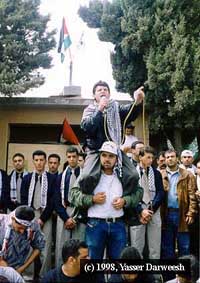
In the period after the first Palestinian national elections in early 1996, it has become more and more common to hear people say that Birzeit's elections are no longer the barometer of Palestinian public opinion that they once were. The belief that students are generally more radical than the rest of society is also offered as supporting evidence for this theory.
Yet Birzeit remains a community where the on-campus manifestation of those from both well-off and lower-income backgrounds; of town, village and refugee camp dwellers; and of those from the various areas of the West Bank and Gaza Strip remains refreshingly diverse. The Birzeit elections also boast something that was sorely missing from the national elections - opposition parties.
The amount of weight that the national leadership of the various Palestinian political factions gives to the Birzeit elections speaks of their importance, something that derives from the university's position in Palestinian society. As in all political systems, the amount of money involved reflects the perceived importance of an issue.
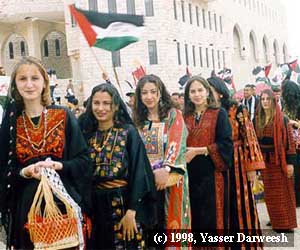
According to a variety of sources, the amount invested in student election campaigns is enormous when compared to the average monthly West Bank income of $300. For three years, those responsible for finances in the Jerusalem Bloc at Birzeit, also known as "Shabibi", the youth wing of Arafat's Fatah faction, have stated that the bloc's expenditure on election leaflets, banners, T-shirts, hats and various equipment has reached the $10,000 mark.
From the materials other blocs use in their campaigns, one can estimate that the figure for the Islamic Bloc is in the region of $4,000 and the left-wing coalition, while the Democratic Student Pole reports around $2,500. The expenditure of the remaining two factions, the Bloc of the Martyr Fathi Shiqaqi and the Changes Bloc, is negligible.
Shabibi's high level of funding can be seen as a direct consequence of the position Fatah holds in the Palestinian Authority. Last year's election saw the Islamic Bloc produce a copy of a receipt for $30,000 from the Ministry of Finance, made out to the Shabibi Bloc at Birzeit University. The figure far exceeds declared campaign expenses because there are other, more indirect ways of winning favour from the student body.
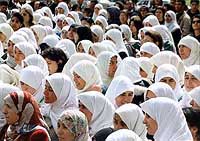
Last year, during the Muslim feast of 'Eid Al-Fittr and shortly before the elections began, the Shabibi bloc held a party at the Merryland restaurant in Ramallah for the university's 180 Gazan students prevented, by severe Israeli restrictions on freedom of movement, from spending the holiday with their families in Gaza. Simultaneously, $200-300 as a 'holiday gift' was given those Gazan students who were known not to be committed activists in any other bloc.
In addition to this patronage system, success itself is also very profitable. This year, in the run up to the campaign, two Shabibi bloc members were overheard arguing about attendance at meetings. "Why haven't you been attending the preparatory meetings?" said the senior member of the two, "Don't you understand that this is the student council elections? There is lots of money to be made! Money like you wouldn't believe!"
Exactly how much money is involved was revealed last year by disgruntled Shabibi members left out of the bonus system, who reported that $62,000 had been given as a victory gift to the bloc by Palestinian President Yasser Arafat. According to one account, five members of the leadership who were getting married received $5,000 each, executive members received $1,000 each, and the rest was distributed to activists and to representatives of the various internal political streams in the faction. In addition, five graduating members of the Shabibi leadership were awarded positions in ministries of the Palestinian Authority.
In one of Arafat's recent visits to Ramallah before the Birzeit elections, members of Shabibi at Birzeit paid him a visit and declared that they would win him 26 of the 51 seats in the Birzeit elections, which would have allowed them to form the eleven-seat student council cabinet entirely from Shabibi members, had they been successful. This, remember, is the same bloc that makes a big issue of its separation from the Palestinian Authority during the election campaign.
The importance of student election success to activists' political careers resulted in bizarre scenes on the campus after what Shabibi saw as its defeat, despite remaining the second most powerful faction on campus. The leader of the bloc passed out after the results were announced, the university medical clinic was quickly filled with another 40-50 Shabibi activists who had fainted with anxiety, and two students leapt from the roof of one of the highest buildings on campus, fortunately only breaking their legs.
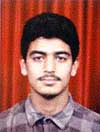
Part of the reason for the Shabibi losses this year can be put down to the arrest of Islamic Bloc candidate Ghassan Addassi (right) during the election campaign, which invited contemplation on the nature of the relationship between Shabibi and the Palestinian Authority, the latter troubled by a reputation of corruption and human rights violations.
The widely-assumed assassination of Muhyideen Al-Shareef in nearby Ramallah was also an important reminder of the continuing intrusiveness of the Israeli occupation which, to people in the street, is the main thing that the PA's participation in the Oslo agreement has failed completely to address.
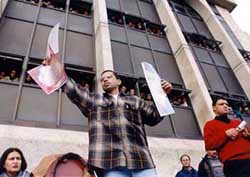
Despite protestations for the last two years, the average student finds it difficult to believe Shabibi's claims that the bloc is distanced from the Palestinian Authority. This view is understandable in the light of the well-known fact that many students, mainly from Shabibi, work for the various Palestinian security apparatuses.
The most recent demonstration of this took place, ironically, the day after the election. Leaders in the Islamic Bloc noticed that the head of the Bloc was being watched. Just before he left the campus two students, who were observed to be following him, made a call from a public phone on campus. They were overheard saying that he was just leaving the campus and describing the type, colour, and the license plate number of the car, and the direction it was taking.
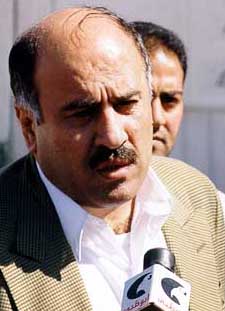
As he left the campus, he was stopped and arrested by members of the Palestinian Preventative Security (PSS) Service. Taken to the PSS headquarters in Ramallah, he was interrogated personally by Jibril Rajoub (right), West Bank head of the PSS. The majority of Rajoub's questions revolved around the elections and his disbelief of "how the Islamic Bloc could have won." The student was released the following day.
Despite all these unsettling issues, it is the free and transparent nature of Birzeit University's electoral process that ultimately guarantees the preservation of democracy on campus during this sensitive time.

The presence of a system, in a country still very much learning and accepting this skill, and the firmly established 'electoral rule of law' on campus both provide the 'glue' that keeps the whole process running smoothly.
The elections, which every year run under a banner conceived by the public relations office at the university, have played varying bars from the same theme these last four years. In 1995, the elections were "a model for Palestinian democracy", a genuine claim in the wake of the introduction of a proportional representation system and the presence of observers from the Center for Palestine Research and Studies (CRPS) in Nablus, who were involved in the following national elections.
Last year's banner of "the democratic tradition continues" and this year's "towards a democratic future", evoked memories of former Shabiba student council president Ibrahim Al-Khreishi's declaration that Birzeit was an "oasis of democracy". In Birzeit, where democracy wins every election, a message is going forth to the wider community that there are better models of government than those of Arab regimes imported by the formerly exiled PLO leadership.
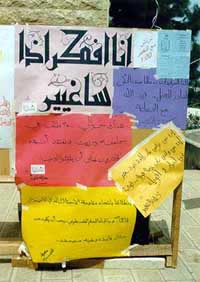
This year did see some profound changes. The student bloc of that same name was characterised by its anti-interference stance towards the national parties, who approach student politics as part of their own game of chess, was once a very unpalatable message in the factionalised atmosphere of Palestinian society.
The Change Bloc's small two-seat victory is one small example of how Palestinian society is adjusting to the new realities on the ground by creating new realities of their own. The message of Birzeit's elections should not therefore have been the prevailing and misinformed commentaries on the increasing power of the Islamic movement, but instead that there was a significant change in the status quo.